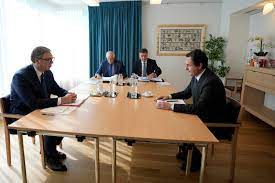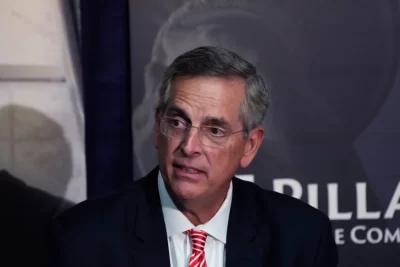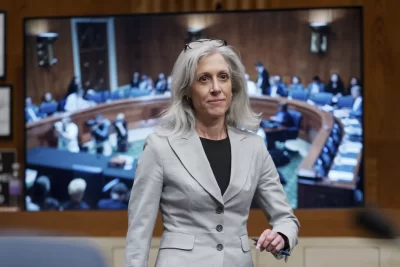
Kosovo’s prime minister on Monday accused the European Union special envoy in the normalization talks with Serbia of not being “neutral and correct” and “coordinating” with Belgrade against Pristina.
Prime Minister Albin Kurti said EU envoy Miroslav Lajcak had coordinated with Serbia’s President Aleksandar Vucic in the EU-facilitated talks held last week in Brussels.
EU foreign policy chief Josep Borrell, who supervised the talks in Brussels, blamed the latest breakdown on Kurti’s insistence that Serbia should essentially recognize his country before progress could be made on enforcing a previous agreement reached in February.
Borrell has warned that the lack of progress could hurt both Serbia’s and Kosovo’s hopes of joining the bloc.
Serbia and its former province of Kosovo have been at odds for decades. Their 1998-1999 war, which ended after a 78-day NATO bombing forced Serbian military and police forces pull out of Kosovo, left more than 10,000 people dead, mostly Kosovo Albanians.
In February, the EU put forward a 10-point plan to end months of political crises. Kurti and Vucic gave their approval at the time, but with some reservations that have still not been resolved.
On Monday, Kurti said Kosovo had offered a step-by-step proposal for the implementation of the agreement reached in February. Serbia has never offered any proposal while Lajcak brought out an old Serbian document they had turned down earlier.
“These are divergent negotiations due to the asymmetry from the mediator, who is not neutral,” said Kurti at a news conference.
“We do not need such a unilateral envoy, not neutral and correct at all, who runs counter to the basic agreement, which is what is happening with the envoy, Lajcak,” he said.
Kurti also criticized Borrell and Lajcak as EU representatives for not reacting to what he described as Serbia’s continuous violation of the February agreement with statements against Kosovo.
It was time for consultations with Brussels, Washington and other main players to bring “the train (i.e. talks) back to the rails,” he said.
“We should return to the basic agreement, how to apply it,” he said. “Serbia’s violation has been encouraged and not punished as the agreement states.”
The future of the talks is at stake as both Serbia and Kosovo seem to be stubbornly sticking to their positions and refusing to compromise.
Kurti, a longtime Kosovo independence activist who served prison time in both Serbia and Kosovo, has proven a thorny interlocutor for negotiators to work with.
In addition, Kosovo was not pleased when Borrell from Spain chose Lajcak from Slovakia, two of the five EU member countries which have not recognized Kosovo as an independent state.
In August, senior lawmakers from the United States — the other diplomatic power in the process — warned that negotiators weren’t pushing the Serbian leader hard enough. They said that the West’s current approach showed a “lack of evenhandedness.”
In May, in a dispute over the validity of local elections in the Serbian minority-dominated part of northern Kosovo, Serbs clashed with security forces, including NATO-led KFOR peacekeepers working there, injuring 93 troops.
There are widespread fears in the West that Moscow could use Belgrade to reignite ethnic conflicts in the Balkans, which experienced a series of bloody conflicts in the 1990s during the breakup of Yugoslavia, to draw world attention away from the war in Ukraine.
Vucic, a former ultranationalist who now claims to want to take Serbia into the EU, has maintained close ties with Russian President Vladimir Putin and has refused to impose sanctions on Russia over its war in Ukraine.
___
Llazar Semini reported from Tirana, Albania.





